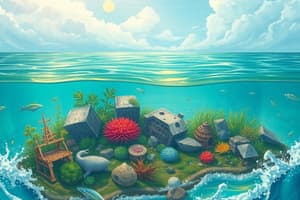Podcast
Questions and Answers
What aspect of ocean science focuses on the movements of water within the Earth's hydrosphere?
What aspect of ocean science focuses on the movements of water within the Earth's hydrosphere?
- Meteorology
- Geophysics
- Astronomy
- Oceanography (correct)
Which scientific field within ocean science is concerned with measuring and mapping the sea floor?
Which scientific field within ocean science is concerned with measuring and mapping the sea floor?
- Hydrography (correct)
- Biology
- Chemistry
- Physics
What does the biological aspect of ocean science primarily study?
What does the biological aspect of ocean science primarily study?
- Currents and waves
- Density gradients in water
- Physical properties of the oceans
- Marine ecosystems and living organisms (correct)
Which area of ocean science relates to the study of the underlying structure of the Earth?
Which area of ocean science relates to the study of the underlying structure of the Earth?
What has led to the increased interest in ocean science in recent years?
What has led to the increased interest in ocean science in recent years?
Which ocean science aspect studies the effects of human influences like pollution and overfishing?
Which ocean science aspect studies the effects of human influences like pollution and overfishing?
What are some key issues being addressed by researchers in the field of ocean science?
What are some key issues being addressed by researchers in the field of ocean science?
How have advancements in technology impacted the exploration of underwater terrains?
How have advancements in technology impacted the exploration of underwater terrains?
What role does ocean science play in supporting industries?
What role does ocean science play in supporting industries?
How do satellite imagery and remote sensing technologies contribute to ocean science?
How do satellite imagery and remote sensing technologies contribute to ocean science?
What is one of the benefits of understanding the complexities of ocean systems mentioned in the text?
What is one of the benefits of understanding the complexities of ocean systems mentioned in the text?
How does ocean science contribute to our understanding of the world around us?
How does ocean science contribute to our understanding of the world around us?
Flashcards are hidden until you start studying
Study Notes
Ocean Science: A Journey of Discovery
Ocean science is a multidisciplinary field encompassing various aspects of marine life, geology, biology, chemistry, physics, meteorology, astronomy, and more. It involves the study of oceans' physical properties like temperature, salinity, currents, waves, tides, eddies, and density gradients. This vast subject also delves into the biological realm, exploring ocean ecosystems, food chains, habitats, and species interactions.
The physical component of ocean science focuses on the movement of water within the Earth's hydrosphere and how it interacts with other parts of our planet. It includes areas such as oceanography, which studies the motions and physical features of the sea; hydrography, concerned with measuring and mapping the sea floor; and geophysics, relating to the study of the underlying structure of the Earth.
In contrast, the biological aspect of ocean science concentrates on the living organisms inhabiting marine environments, from microscopic plankton to large fish, mammals, and plants. Marine ecologists study these ecosystems, their productivity, and the effects of human influences like pollution and overfishing.
In recent years, interest in ocean science has grown alongside concerns about climate change and its impact on the global environment. Some key issues being addressed by researchers in this area include the role of the ocean in regulating our atmosphere, predictions of sea level rise caused by melting polar ice caps, and coral reef bleaching events due to rising temperatures.
The advancements made in technology have enhanced the exploration of underwater terrains and improved data collection methods, leading to significant discoveries. For instance, deep-sea submarines allow scientists to explore the depths of the ocean floor while remotely operated vehicles can navigate through treacherous terrain without risking damage to expensive equipment. Satellite imagery and remote sensing technologies help us monitor ocean surface conditions worldwide.
Ocean science isn't just about discovery; it also plays a critical role in supporting industries such as fisheries management, oil drilling operations, shipping routes planning, tourism development, and even space exploration. Understanding the complexities of ocean systems helps us better predict weather patterns, develop strategies for sustainable resource extraction, and mitigate potential environmental hazards.
In conclusion, ocean science is a broad discipline that brings together diverse fields to understand one of Earth's most vital resources, the ocean. Through its continued growth and evolution, this field contributes to our understanding of the world around us, drives innovation, and supports numerous industries while addressing pressing environmental challenges.
Studying That Suits You
Use AI to generate personalized quizzes and flashcards to suit your learning preferences.





